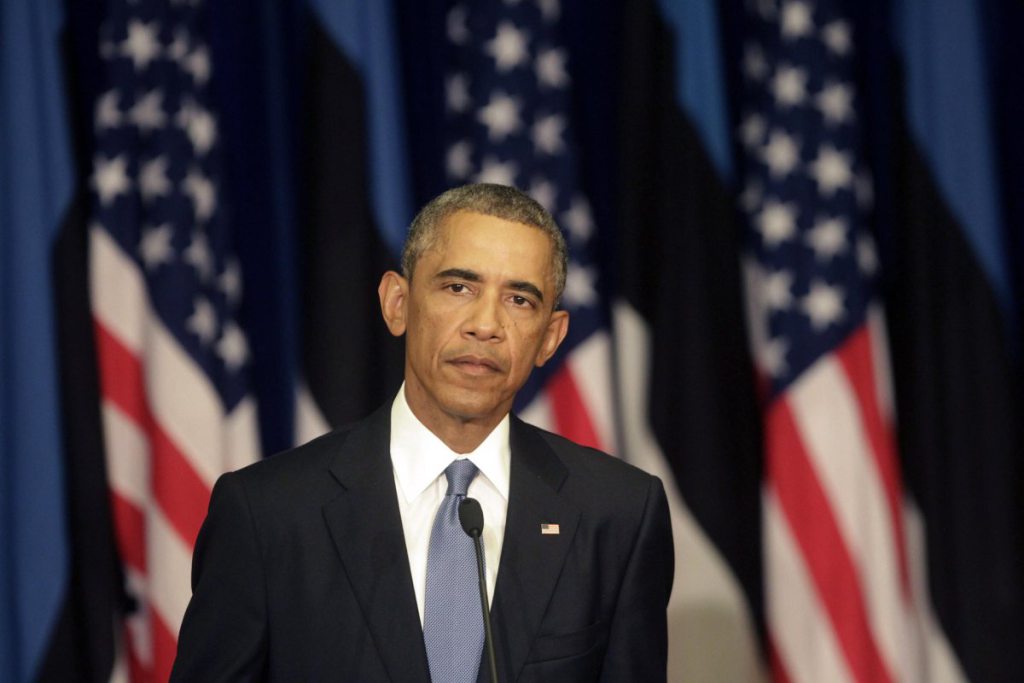
The Islamic Republic has taken great offense at remarks last week by President Obama and charged he is trying to foment frictions among Muslims and promote hatred for Iran.
In an interview with The Atlantic magazine last Thursday, Obama spoke of “destabilizing activities” by Iran’s Qods Force and also responded to questions about anti-Semitism in Iran.
Foreign Ministry spokeswoman Marziyeh Afkham said Obama’s comments were part of an Iranophobic plot aimed at “fomenting regional crises and fueling division and hatred. She said the historical facts showed Iran had played nothing but a “constructive and peaceful role” in the region as well as in the world.
Instead of smearing Iran, Afkham said, the United States ought to do more to stop the massacre of Muslims by Takfiri terrorists and to block the growing tendency to Islamophobia that is raging in the United States.
She didn’t say anything about the raging anti-Americanism within Iran that the Islamic Republic avidly promotes on a daily basis.
As for the issue of anti-Semitism in Iran, Afkham said the Islamic Republic respects Jews and Judaism and its opposition to Zionism and the State of Israel has nothing to do with religion.
In the interview, Obama was asked how he could describe a regime that is anti-Semitic as being rational and therefore likely to adhere to any nuclear agreement.
Obama didn’t question the use of the anti-Semitic description. He responded: “Well, the fact that you are anti-Semitic, or racist, doesn’t preclude you from being interested in survival. It doesn’t preclude you from being rational about the need to keep your economy afloat; it doesn’t preclude you from making strategic decisions about how you stay in power. And, so, the fact that the Supreme Leader is anti-Semitic doesn’t mean that this overrides all of his other considerations….
“I think it is not at all contradictory to say that there are deep strains of anti-Semitism in the core regime, but that they also are interested in maintaining power, having some semblance of legitimacy inside their own country, which requires that they get themselves out of what is a deep economic rut that we’ve put them in. And, on that basis, they are then willing and prepared potentially to strike an agreement on their nuclear program.”
Later in the interview, he discussed concerns of the leaders of the Gulf Cooperation Council (GCC) countries, with whom he met earlier this month at Camp David. He acknowledged that they fear Iran will get a lot of money as a result of any nuclear agreement and will spend that on groups that will destabilize the Arab world.
Obama gave a detailed response. Here is the full text of what he said in The Atlantic interview about Iran as a destabilizing force in the Arab world.
“This is an issue that came up with the GCC countries during the summit. The point we simply make to them is: It is not a mathematical formula whereby [Iranian leaders] get a certain amount of sanctions relief and automatically they’re causing more problems in the neighborhood….
“In the discussion with the GCC countries, we pointed out that the biggest vulnerabilities that they have [with regard] to Iran, and the most effective destabilizing activities of the IRGC [Pasdaran] and Qods Force are actually low-cost. They are not a threat to the region because of their hardware. Ballistic missiles are a concern. They have a missile program. We have to think about missile-defense systems and how those are integrated and coordinated.
“But the big problems we have are weapons going in to Hezbollah, or them sending agents into Yemen, or other low-tech, asymmetric threats that they’re very effective at exploiting, which they’re already doing—they’ve been doing despite sanctions.
“They will continue to do [this] unless we are developing greater capacity to prevent them from doing those things, which is part of what our discussion was in terms of the security assurances with the GCC countries.
“You know, if you look at a situation like Yemen, part of the problem is the chronic, endemic weakness in a state like that, and the instability that Iran then seeks to exploit. If you had GCC countries who were more capable of maritime interdiction, effective intelligence, cutting off financing sources, and are more effective in terms of working and training with allied forces in a place like Yemen, so that Houthis can’t just march into Sanaa, well, if all those things are being done, Iran having some additional dollars from sanctions relief is not going to override those improvements and capabilities. And that’s really where we have to focus.
“Likewise with respect to Hezbollah—Hezbollah has a certain number of fighters who are hardened and effective. If Iran has some additional resources, then perhaps they’re less strained in trying to make payroll when it comes to Hezbollah. But it’s not as if they can suddenly train up and successfully deploy 10 times the number of Hezbollah fighters that are currently in Syria. That’s not something that they have automatic capacity to do. The reason that Hezbollah is effective is because they’ve got a core group of hardened folks that they’ve developed over the last 20-30 years.”
Afkham bristled at Obama’s citing of Iran as destabilizing, but she did not address any of the many points he raised in detail in the interview.




















